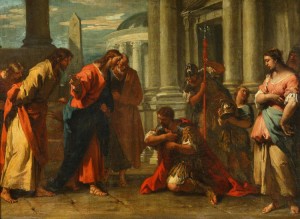Thoughts on Today’s Lessons for May 29, 2016

Christ Heals the Centurion’s Servant. Sebastiano Ricci, oil on canvas, 1726-29; The Prague National Gallery.
This Sunday we return to Ordinary Time, six months of liturgically green Sundays that last until Advent. We return to the Gospel of Luke where we left off before Easter, and follow Jesus’ life to the days before his last week in Jerusalem. Our First Testament readings move through Israel’s ancient history in 1 and 2 Kings to a tour of the prophets Amos, Hosea, Isaiah and Jeremiah, followed by a quick sampler from other, minor prophets. Our New Testament readings will offer us the writings of Paul and other leaders of the early church in Galatians, Colossians, Hebrews, Philemon, 1 and 2 Timothy, and 2 Thessalonians. Today’s First Reading from 1 Kings tells the ancient story of the Prophet Elijah calling down God’s power to bring a wandering people back from their fascination with the pagan god Baal.
The Lectionary usually chooses a Psalm to fit the spirit of the day’s other readings, and this exultant song of praise for God and God’s greatness fits in well with the 1 Kings account of Elijah demonstrating God’s power and might: God’s glory is declared among all the nations, not to Israel alone. God is great, God is greatly to be praised, and God “is more to be feared than all gods.” The gods of the other nations – surely including Baal of the Canaanites – are only idols.
Second Reading: Galatians 1:1-12
There’s trouble in Galatia, and Paul is righteously angry. Paul loved the people of this church, but after he moved on to his next mission, meddlers arrived with false teachings: a new and contrary gospel, confusing and perverting the Gospel of Christ that Paul had taught! Paul’s revelation came to him directly from Christ, he proclaims. Curse the false gospel and those who proclaim it! Watch this theme develop as we spend six weeks with Galatians.
Gospel: Luke 7:1-10
Roman centurions appear several times in Luke’s Gospel and his Acts; and somewhat surprisingly they are regarded favorably, even though they were ranking officers in the hated, occupying Roman army. This event comes immediately after Jesus has taught love of neighbor in the Beatitudes. Perhaps Jesus’ recognition of this Roman’s faith shows the world that Jesus has come for all the nations.
